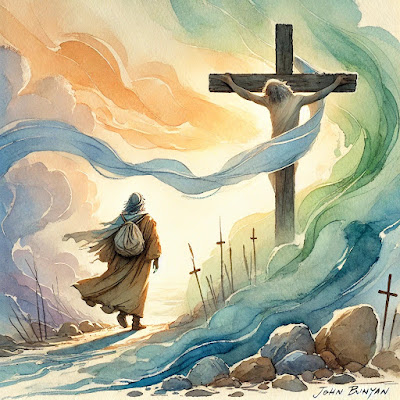Free Will and God’s Sovereignty
Trusting God’s Sovereignty While Embracing Responsibility
Come, Rest, and Respond: Living in God’s Sovereign Plan
Tension of Trusting God and Responding in Faith
The tension between God’s sovereignty and human responsibility is one of the great mysteries of the Christian faith. If God is sovereign and ultimately in control, does that mean we are absolved of responsibility for our actions? Do we truly have free will, or is everything pre-determined? The Bible consistently teaches both: God is in complete control, yet we are fully responsible for our choices.
This truth is beautifully reflected in today’s readings:
• Psalm 9:7–12 reminds us that God reigns forever, establishes justice, and protects the oppressed. His sovereignty is unshakable, yet the psalm also calls us to declare His deeds and place our trust in Him.
• Matthew 11:16–30 reveals the responsibility of those who witnessed the ministry of Jesus and John the Baptist. Despite seeing God’s works firsthand, many rejected the call to repentance and grace. Jesus laments their hard-heartedness, highlighting human responsibility in the face of divine revelation. Yet, in verses 28–30, He offers a tender invitation: “Come to me, all you who are weary and burdened, and I will give you rest.” This invitation demonstrates both God’s sovereignty in offering rest and humanity’s responsibility to respond.
• Genesis 29:1–30:43 recounts Jacob’s journey—filled with personal choices, struggles, and relationships. Despite human flaws, God’s sovereign purposes are fulfilled as He continues to build His covenant people.
Sovereignty and Free Will in Harmony
The Bible does not present God’s sovereignty and human free will as contradictory. Instead, it reveals how God’s overarching plan works through our decisions, actions, and even our failures. Let’s consider how these truths apply to our lives:
1. God’s Sovereignty Does Not Absolve Us of Responsibility
While God is sovereign, He calls us to live wisely and make responsible choices. Jacob’s story in Genesis shows that human actions have real consequences. Yet, even when Jacob’s decisions were driven by personal desires, God’s greater purpose—to establish the nation of Israel—was never thwarted. In the same way, our choices matter, but they do not undermine God’s ultimate plan.
2. Free Will Exists Within God’s Sovereign Plan
Jesus’ invitation in Matthew 11:28 is both genuine and gracious: “Come to me.” This is a choice that each of us must make. God does not coerce us; He invites us. His sovereignty ensures that His purposes will be accomplished, but our responsibility lies in responding to His invitation with faith and trust.
3. God’s Sovereignty Brings Assurance, Not Fatalism
Knowing that God reigns eternally (Psalm 9:7) should not lead us to fatalism but to assurance. In a world that often feels chaotic, God’s sovereignty anchors us. We can rest in the knowledge that He is working all things for good (Romans 8:28). This truth is not an excuse for passivity but an encouragement to live boldly, trusting that our lives are in His hands.
The Invitation to Rest
Perhaps the most comforting words in today’s readings come from Jesus in Matthew 11:28: “Come to me, all you who are weary and burdened, and I will give you rest.”
This invitation speaks to those who feel overwhelmed by life’s burdens, whether they stem from external circumstances or the weight of their own decisions. Jesus invites us to exchange our weariness for His rest, our striving for His peace.
His invitation is a call to trust in God’s sovereignty while actively embracing our responsibility to come to Him, learn from Him, and walk in step with Him. The yoke Jesus offers is easy, not because life becomes devoid of struggle, but because we are no longer bearing the weight alone. We walk with the One who is sovereign over all.
Living in the Tension
As Christians, we live in the tension between trusting God’s sovereignty and embracing our responsibility. We are not passive spectators in life, nor are we burdened by the impossible task of controlling everything. Instead, we are called to:
1. Trust in God’s perfect plan and timing, knowing He reigns forever.
2. Respond in faith and obedience, making choices that honor Him.
3. Rest in the assurance that, even when we falter, His purposes will prevail.
In this tension, we find freedom—not the freedom to live irresponsibly, but the freedom to live confidently, knowing that God is working all things together for our good and His glory.
Will You Respond?
The question is not whether God is sovereign—He reigns eternally. The question is how we will respond. Will we, like those in Matthew 11 who rejected Jesus, resist His invitation? Or will we come to Him, weary as we are, and find rest for our souls?
God’s sovereignty does not negate our responsibility; it empowers us to live courageously. Today, may you find peace in trusting His sovereign hand while faithfully walking in obedience. And may you respond to Jesus’ invitation, knowing that His yoke is easy and His burden is light.
“Come to me, all you who are weary and burdened, and I will give you rest.” —Matthew 11:28
Prayer:
Lord, You reign forever, and Your purposes stand firm through every generation. Thank You for inviting us to come to You with our burdens and find rest in Your perfect plan. Help us to trust in Your sovereignty while walking faithfully in obedience. Give us wisdom in our choices, courage in our responsibility, and peace in knowing that You are in control. May we find joy in being yoked to Christ, whose yoke is easy and burden is light. In Jesus’ name, Amen.







